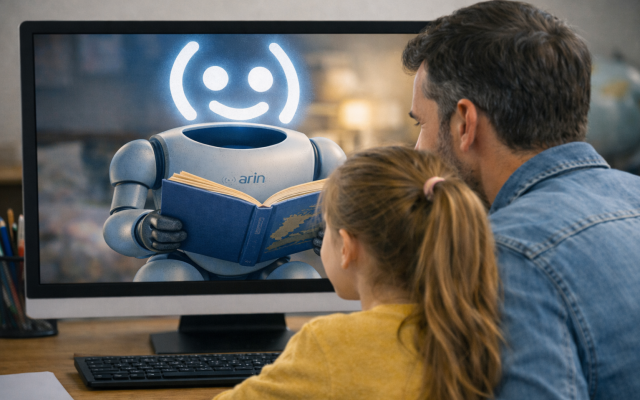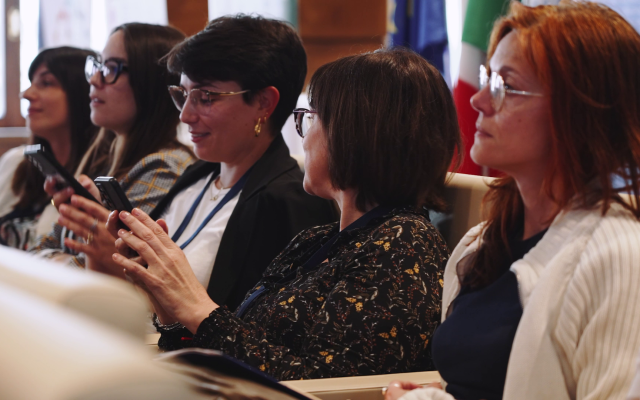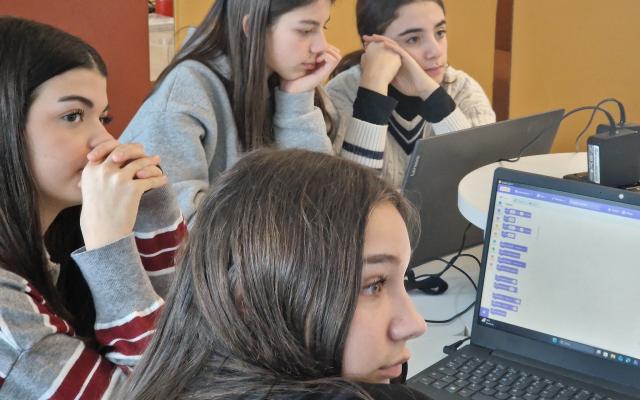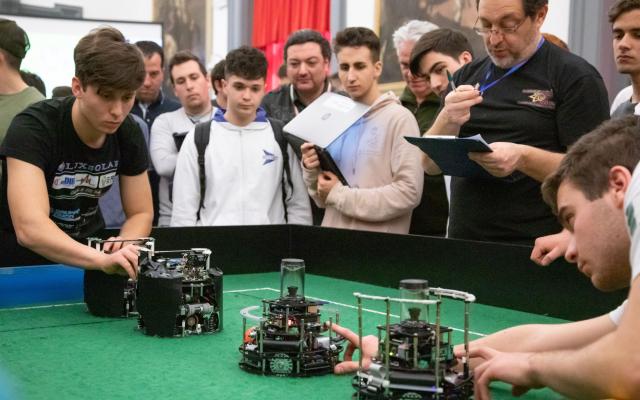At RomeCup 2025, a talk by Gianluigi Greco, president of AIxIA
With the sharing of the speech by Gianluigi Greco, full professor of Computer Science at the University of Calabria and president of the Italian Association for Artificial Intelligence, we are launching a new series of in-depth articles dedicated to RomeCup 2025 (7-9 May 2025).
In his speech at the inaugural conference at Roma Tre University (7 May), Greco offered a lucid and passionate reflection on the impact of artificial intelligence on our daily lives. Starting from the role of ethics and the value of human skills, such as the ability to ask questions, reflective thinking and empathy, his contribution invites us to rethink the way we live and build relationships with emerging technologies.
We are making these insights available to schools and educational communities so that we can continue to think critically together about the present and future of artificial intelligence and robotics.
Watch the video of the speech
First of all, thank you for the invitation and for the warm welcome. This is a wonderful initiative, and I always enjoy being among young people. As I said to the Rector, I was pleasantly surprised by the large turnout.
I would like to talk about ethics, starting with you, the audience. We often underestimate a fundamental aspect: our ability to coexist with technology and understand that these tools are already changing our lives. We therefore need to develop technical skills on the one hand, but also a critical spirit on the other.
And it is no coincidence that this critical spirit does not entirely belong to my generation. Although I am one of the youngest university professors, I already feel distant from the new generations who were born into a digital world.
You are facing a completely new challenge: you live in a world where true and false are not always easily distinguishable, where the boundaries between reality and fiction are increasingly blurred.
So, talking about ethics means starting to understand these changes from primary school. The skills needed are not only technological. Of course, I am an engineer, I work in the field of information technology, and I believe technical expertise is essential. But today I would like to talk about something else.
In Italy, in particular, we are facing a double crisis: demographic and skills. We cannot find enough qualified professionals, and this is holding back growth. But, I repeat, today I want to focus on other skills, those needed to truly face the future.
Let me give you an example: if I now take my smartphone and point it at this room, there is an app that tells me in real time how many faces it is detecting. This technology has been around since 2016. But if I wanted to know what you are thinking, what you are saying to each other in whispers, what emotions you are feeling... well, machines cannot do that.
There is no database of common sense, no database for recognising complex emotions or understanding social contexts such as a dinner at a restaurant. They can analyse gestures and expressions, but not what is ‘behind the scenes’. So, the first skill I would like to leave you with is this: the ability to think slowly, reflectively and abstractly. Machines are very good at ‘fast thinking’, i.e. statistical thinking, but they cannot reflect like we do.
The second fundamental skill is the art of asking questions. These systems are statistical: they respond according to probabilities. If you ask, ‘Draw me a room without elephants’, they will often give you... a room with elephants! Because you mentioned the word ‘elephant’ twice in the sentence.
Understanding how to formulate a question and knowing how models work is essential for interacting with artificial intelligence.
And the third, even more crucial skill is linguistic competence.
Have you noticed that many texts generated by ChatGPT are similar? You can recognise them immediately. It's almost a ‘reverse Turing test’: if a text is too fluid, too orderly... it was probably written by AI.
I sometimes use it myself to write something quickly, but I realise that I am losing the habit of writing well. Let me give you an example: I asked ChatGPT to write a verse using the words ‘cheek’, ‘night’, ‘jewel’, ‘ear’ and ‘Ethiopian’. The result was:
‘The night shines on the cheeks, a jewel hangs from the Ethiopian ear’.
It's nice, it sounds good. But... it doesn't say anything. I did it because there is a similar verse in Romeo and Juliet: ‘It seems to hang on the cheeks of the night like a rich jewel from the ear of an Ethiopian’. Here there is poetry, meaning, imagination. The point is that machines cannot generate what is rare, precious, unique. And I fear that we too are losing our taste for this complexity of language.
The last and most important skill: empathy. In a recent experiment promoted by Google (yes, with all the biases that entails), patients were asked to interact with a tablet that asked them health questions. At the end, they were asked: ‘Did you talk to a doctor or a machine?’.The result? The perception of empathy was higher with the bot.
This is a wake-up call. We have already automated the mind (with AI), and before that we automated the arm (with industry). Now we are perhaps beginning to automate the heart as well.And so ethics must serve precisely to remain human, to value relationships, the way we relate to others. Perhaps this is our true frontier.
Moderator's question
Professor, a few years ago, some researchers defined language models as ‘stochastic parrots’. In practice, they do not understand what they are saying, but ‘guess’ the next sequence of words. But today, they seem to be able to simulate reasoning. Can we still call them stochastic parrots?
Greco
Yes, absolutely. Those who work in the field, those who teach three-year or master's courses in artificial intelligence, see ‘behind the scenes’ and confirm: they are still ‘stochastic parrots’. The real revolution is something else: we have realised that our language can be reproduced with extreme precision by statistical dynamics. Before the arrival of GPT, AI could recognise, for example, a stop sign because it had seen millions of examples. But text is something else: it's words, not numbers. The conceptual leap was understanding how to transform words into numbers that neural networks could work with. Once this problem was solved, the system worked: it takes a portion of text and predicts the next word. This tells us a lot about how we reason and how we construct language. But the challenge now is to go further: to understand what new things we can create that machines cannot yet do.



